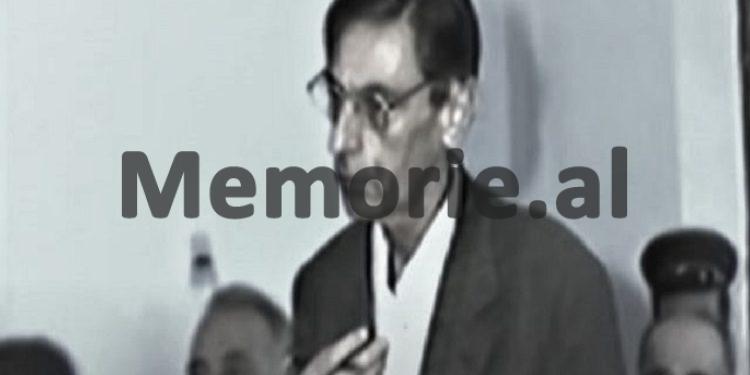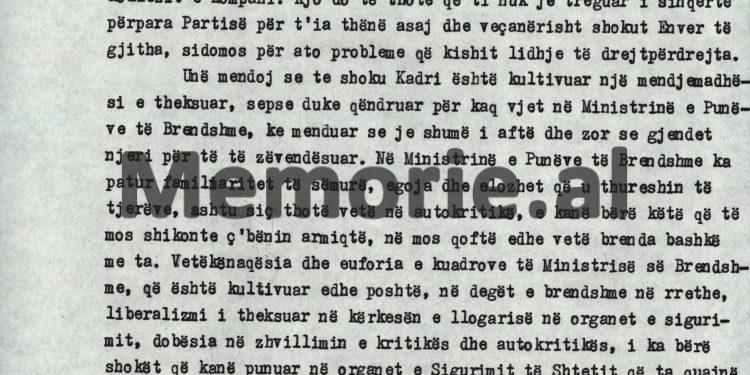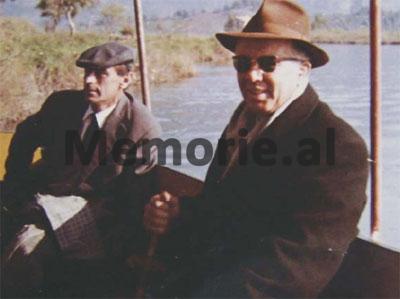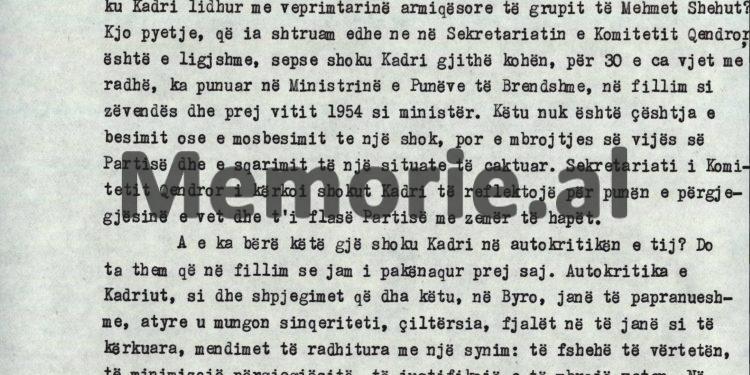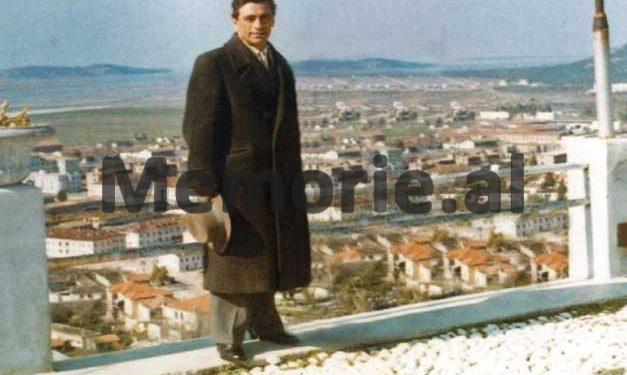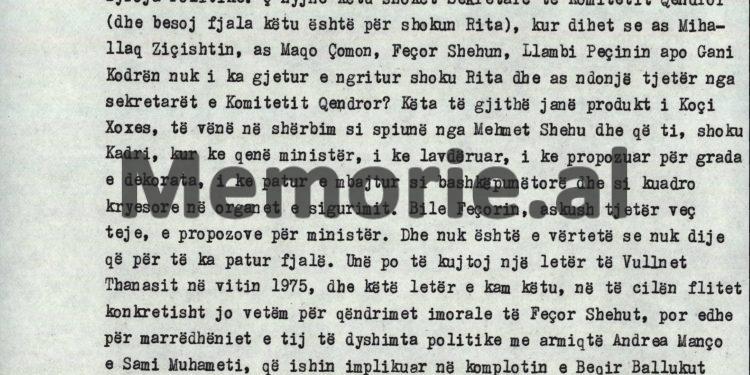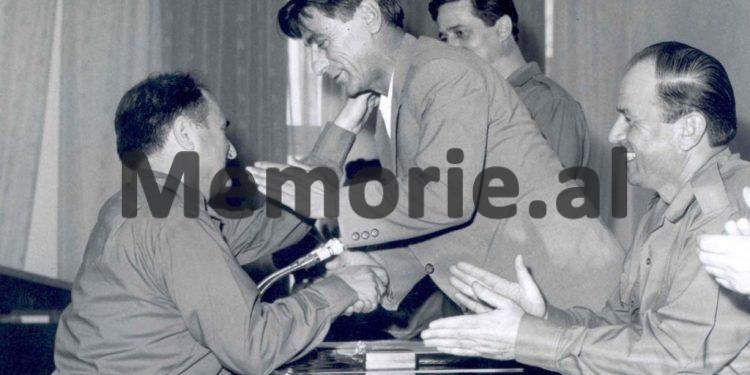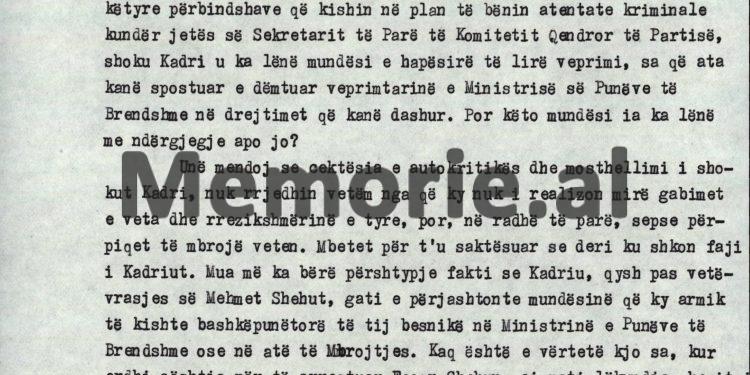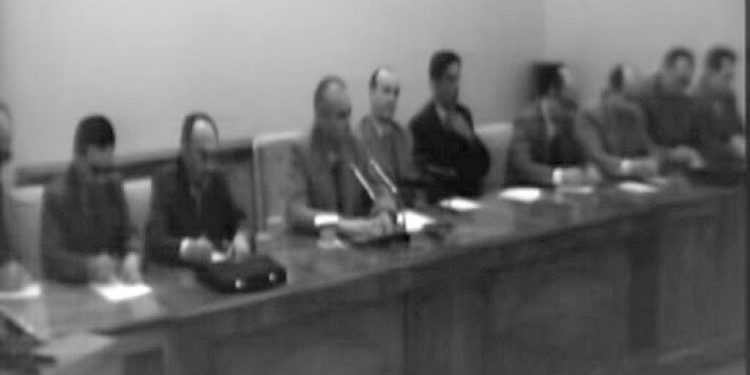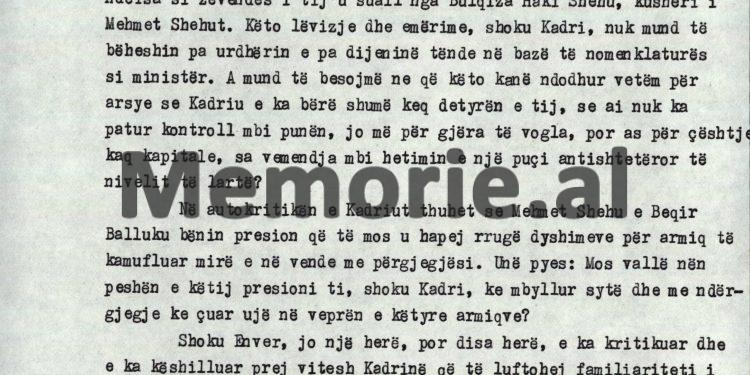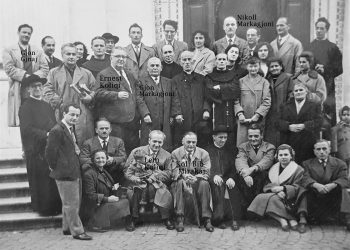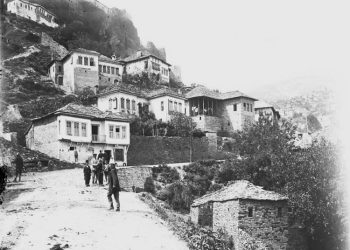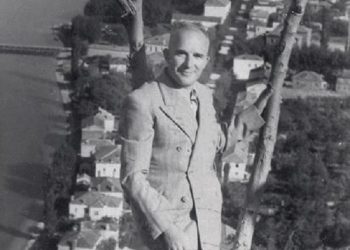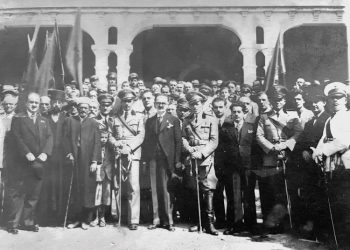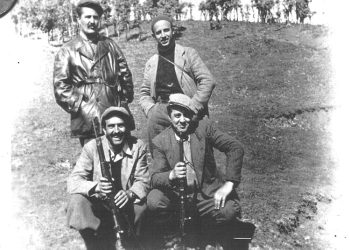Dashnor Kaloçi
Part thirty one
Memorie.al/publishes some archival documents extracted from the Central State Archive in Tirana (the fund of the former PPSh Central Committee), which belong to the year 1982, where there is a file with relations, reports, instructions, information, letters, minutes of meetings of the Political Bureau, the Secretariat of the Central Committee, etc., regarding the “hostile activity” of the member of the Political Bureau and the Minister of People’s Defense, Kadri Hazbiu, as well as some of his closest collaborators, such as : Feçor Shehu, Mihallaq Ziçishti, Llambi Peçini, Zoi Themeli, etc., who were accused by Enver Hoxha, as “the main collaborators of the police agent Mehmet Shehu”. In the file in question, there is also a document with Kadri Hazbi’s self-criticism, dated September 27, 1982, sent to Enver Hoxha and the Political Bureau of the Central Committee of the PPSh, regarding “his poor work at the head of the Ministry of of Internal Affairs and the lack of vigilance, for not detecting hostile groups, all of which the party and Comrade Enver had discovered”. In this document, the former head of the Ministry of the Interior writes: “From the beginning of September, when I was getting my hair cut, a driver who works with the transport lines abroad came to me and told me that, returning from abroad, the drivers they had spoken badly about my fate. I didn’t ask him what he had been told, but I told him to go and report it where it should be. He added in more detail that he had spoken to the companion who stays with me, which I ordered him to report. He told me that he had done this. I don’t know whether I told him about this case or not, friend Hekuran. After a few days when I returned from a 3-4 day service, my family told me for the first time that they are taking us on the phone and so on, in meetings they ask about you, where are you and how are you, because we have heard things not good, as if we have escaped as a family abroad, as if I have been dismissed from my position as Minister of Defense, etc. I told you that anyone who asks about us, you say we are fine and don’t engage in further conversation. I emphasize that these things have spread so much that even one of the workers who serves in my family left without expecting that something is happening with me and my family. All these things, I told my friend Ramiz, together with my opinion that there is not enough fight against these harmful slogans and that they are spreading from Tirana in the first place”. Likewise, the document in question also contains the minutes of the meeting of the Political Bureau of the Central Committee of the PPSh, held on October 8, 1982, where the “hostile activity of Kadri Hazbi” from the period after the war when he was in the position of Chief of Army Security, which has brought fierce debates, they all discussed, starting from: Adil Çarçani, Hekuran Isai, Simon Stefani, Manush Muftiu, Rita Marko, Prokop Murra, Photo Çami, Lenka Çuko, Pali Miska, Besnik Bekteshi, Muho Asllani and Llambi Gegprifti. Even the debates and strong tones in that meeting were not absent between Enver Hoxha and Kadri Hazbiu, which continued throughout the meeting, for several sessions. But for more about these, we know the document, which is published for the first time by Memorie.al
Continues from last issue
The document with the minutes of the meeting of the Political Bureau of the Central Committee of the PPSh, held on October 8, 1982, where the “hostile activity” of Kadri Hazbi was analyzed
ALBANIAN LABOR PARTY TOP SECRET
CENTRAL COMMITTEE
RECORDS
OF THE MEETING OF THE POLITICAL BUREAU OF THE PPS CENTRAL COMMITTEE ON OCTOBER 8, 1982
Agenda:
- Discussion on the serious words of friend Kadri Hazbiu
- Approval of the report on transport to the plenum
All members of the Political Bureau are present at the meeting.
DEVELOPMENT OF THE MEETING
The meeting was opened and led by the first secretary of the Central Committee of the PPS, Comrade Enver Hoxha.
Discussion on the serious crimes of comrade Kadri Hazbiu.
COMRADE RAMIZ ALIA: While Sami Muhameti, not only did he not go to prison, but to protect himself he became an accomplice of the State Security. So the Party has not hidden anything from you, but you are the one who has hidden things from the Party, and even today you want to hide the truth from it. Kadri Hazbi’s self-criticism is extremely shallow, if we consider that it is about the 40-year activity of a group of spies who acted freely and without any obstacles under the nose of comrade Kadri.
At least we can tell you, these agents, these conspirators, who worked for the liquidation of the independence and socialism of Albania, these monsters who planned to make criminal attempts on the life of the First Secretary of the Central Committee of the Labor Party of Albania, Comrade Kadri has left you opportunities and free space for action so that they have displaced and damaged the activity of the Ministry of Internal Affairs, in the directions they wanted. But did you leave these opportunities with a conscience or not?!
I think that the shallowness of the self-criticism and lack of depth of Comrade Kadri does not come only from the fact that he does not realize his mistakes and their dangerousness, but primarily because he tries to protect himself. It remains to be determined how far Kadri’s fault goes. I was impressed by the fact that Kadri Hazbiu, right after the suicide of Mehmet Shehu, almost ruled out the possibility that this enemy would have his loyal collaborators in the ranks of the Ministry of Interior and the Ministry of Defense.
This is so true, that when the issue came to arrest Feçor Shehu, he hesitated and hesitated on the pretext that we should not make a mistake, lest Fiqreti lead us to a dead end, how is it possible that the barber of Hotel Dajti, he said, played the role of the liaison between Feçor and the Yugoslavs ?! None of this stood. And it was proven with facts that did not hold. The real reason for Kadri’s hesitation was that he did not want to admit that there were enemies in the Ministry of Internal Affairs, because this fact complicated the problem.
And the question arises: What did he do for 30 years in a row?! What did he know and what did he not know about these conspiratorial enemies and what responsibility did he have over them?! And the Party, friend Kadri, requires facts and not words. From the depositions of Fiqrete Shehu, it appears that both the investigations and the process of Beqir Balluk and other enemies were manipulated, so that the thread of the sock would not be removed, the name of Mehmet Shehu and his gang would not appear. And you, where were you friend Kadri?! How is it possible that Feçori, who did not shine with intelligence, threw it so openly?!
Now we are learning that Mehmet Shehu’s man, Idriz Seiti, was appointed commander of the group of guards, to keep Beqir Balluk and his friends in prison, while as his deputy, Bulqiza Haki Shehu, Mehmet Shehu’s cousin, was brought. These movements and appointments, Comrade Kadri, could not be made without your order and knowledge, based on the nomenclature as a minister.
Can we believe that these things happened, just because Kadriu did his job very badly, that he didn’t have control over the work, no longer for small things, but not for matters as capital as attention to the investigation of a high-level anti-state coup?!
In Kadri Hazbiu’s self-criticism, it is said that Mehmet Shehu and Beqir Balluku put pressure so that suspicions about well-camouflaged enemies with positions in charge would not open up. I ask: under the weight of this pressure, you, friend Kadri, have closed your eyes and with conscience have taken water in the work of these enemies?! Comrade Enver, not once, but several times, has criticized and advised Kadri for years to fight the sick familiarity that has existed in the internal affairs bodies. But the fight against this familiarity turns out to have been formal, and completely baseless.
The fact is that Feçor Shehu, Mihallaq Ziçishti, Llambi Peçini, and even Gani Kodra, whom you knew as the watchdog and buffoon of Beqir Balluku and Mehmet Shehu, have threshed in the ministry and you didn’t know anything?! Because you had your eyes closed by the sick familiarity, by the absolute complacency about the work of the State Security bodies, by the trust and society in crooked ways, which characterized your relations in the ministry.
Was this a working method, to stifle the revolutionary vigilance in the employees of the Security?! You friend Kadri, you seem like a simple person, a friend who meets people, who puts his hand around their neck, who drinks coffee or plays chess in the ministry club, with a driver, with a clerk, with an operational worker, etc. But I have the impression that this is only the external and formal appearance of the matter. Basically, these actions, this formal simplicity, not only inspire a healthy familiarity, but it is also calculated and nurtures certain popularity, a certain cult for itself, outside the norms of the Party.
You friend Kadri, you are unrestrained when you think that your personality is violated. You were extremely worried about the slogans that were spread about you and you did not reflect that, despite the fact that they were invented and spread by the enemy, they also reflected the right concern of the people who felt that you have a special responsibility, regarding the great damage that have brought the discovered conspirators to the Party. You were very worried that you did not mention your official function as Minister of Defense at the Peza party, and vented with banal expressions about a fellow leader.
You revolt even here in the Bureau, when your friends ask you for clarifications about the mistakes you have made. This is an expression of a pronounced megalomania. Be convinced, Comrade Kadri, that the enemies since Mehmet Shehu and his collaborators that you had around you, have recognized these weaknesses and have exploited them, with or without your knowledge, to the detriment of the Party and interests of the country. Comrade Kadri’s responsibility is particularly great for the issue of the Soviets. There is no excuse for this.
With the advisers here, as well as with the Security bodies of the Soviet Union and other revisionist countries, he acted to the detriment of the interests of the Party and the Security of our State. The danger of this action is obvious. The Soviet advisers of the KGB were allowed to know all our agencies (inside and abroad), to know all the anti-party elements and their activities, to know how the enemies worked and how we countered.
And as if these were not enough, the Soviets were sent written reports on the most secret, most delicate matters, while the organs of the KGB and those of the revisionist countries were given a free hand to organize control over all our students, civilian and military, handing over your collaborators, biographical data, moral-political data, and anything else they requested. I emphasize that the serious consequences of this hostile work, which we have felt in the past, may also appear in the future.
The Soviet bodies and the countries of Eastern Europe have not sat and could not sit without using these data against our Party and our country. Not only that, it would cause great damage to the country, and the special concerns that would arise, if this practice were to become known, from thousands of civilian and military cadres who graduated in the Soviet Union or in the countries of other Eastern European countries, whose files (for better or for worse) are in the hands of the Intelligence agencies of these countries. Kadriu, instead of helping the Party to clarify this issue, seeks to find documents or witnesses to prove that he was authorized to act in that way.
The explanations he gives, for this matter, do not convince you, and even attempts to find excuses complicate the problem worse. You Kadri, not only have you not reflected on this dangerous work, not even after 1960, not even after it was accidentally discovered by Comrade Hysni, but not even now that the enemy Mehmet Shehu and his friends in the Ministry of Internal Affairs were unmasked . But even when asked, you jump into accusations against the Central Committee of the Party, and its individual members. You understand the danger that this action entails, that’s why you jump into the attack. But you are wrong.
Here in our Politburo, the well-known principle, according to which the best method of defense is attack, does not apply. In my opinion, the issue is as follows: Kadriu, conceiving the relations with the Soviets as subordinate relations and our safety as an organization that should not hide anything from the KGB, therefore acted against the interests of the Party and the State. As to why he conceived these relationships in this way, this is an issue that remains to be clarified.
In his self-criticism, Kadriu says that: “after 1960, the collaborators who were linked to the Soviets, called them here and we told you not to worry”, and that the ministry took an interest in protecting the foreign agency. What about our students, who were thousands and some of them, could have been poisoned by the Soviet agency, did he care?! Did he ask for the Party’s cooperation on this issue, and if not why didn’t he ask for it?! Comrade Kadri says: “I am who I used to be, believe me, I am not a traitor, and I do not deal with enemies.”
We want to believe this, but Kadriu must explain to the Party how he protected it, how he protected the secrets of the state and the interests of the people, from this dangerous band of enemies?! To justify himself, Kadriu emphasizes: “this is how I found it and this is how I acted”. But previously, an enemy, Mehmet Shehu, was at the head of the Ministry of Interior.
We are asking, why did you walk this path, why did you even widen it?! Because from the documents (and I’m mentioning these since Comrade Kadri doesn’t remember them well), it turns out that Soviet advisers (I’m talking about advisers and not specialists) came to our country for the first time in 1947.
So from 1947 and up to 1950, to some extent and from 1952, there was one adviser in nine departments, while in the Ministry of Industry and Mines, at one time there were four advisers (one for mining, one for industry light, one for fishing, and one for oil).
After 1952 and until 1956, there were advisers in three departments, the Ministry of Industry (for oil), the Ministry of Agriculture, and the Ministry of Communications. While after 1956, only the Ministry of Agriculture and the Combine, or the General Directorate of Oil, had advisors.
As can be seen, the advisers in most departments were kept for a short time. They have helped to organize work in specific sectors, and then they left. The tendency, therefore, has been for their reduction. While in the Ministry of Internal Affairs and that of the People’s Defense, it was done differently.
In the Ministry of the Interior, the Soviet advisers came in 1949 and until 1954 there were 8 people. And from 1955 until the end of 1960, they became a total of 40 people who covered all branches, all sectors, and as Comrade Kadri says: “they had the right to be familiar with everything”, except he emphasizes that of “framework files”.
Although this exception sounds a bit strange. Kadriu must explain to us: Why had the presence of Soviet advisers in the Ministry of Internal Affairs been increasing, while in the entire system of our administration this number had decreased?! Why in the other dicasteries, the advisers have only helped in organizing the work, while in the Ministry of Internal Affairs; you have been left open for every secret, for every file, and for every agent?! Kadri Hazbiu wants to convince us that in order to do so, he received approval from someone (in the party or state line), but is it possible that our Party had two positions on the same problem?!
All the more so that for this matter, we had from the beginning Stalin’s order given to Comrade Enver, that their advisers should stay with us for a little while so that our people could take over the work as soon as possible. Since I referred you to the documents, I will also mention a fact on this occasion. Memorie.al
The next issue follows




